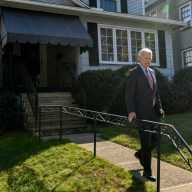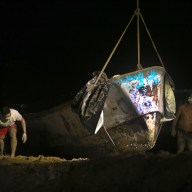OTTAWA – Obama Democrats have quietly sounded out power-brokers in Ottawa looking for advice on how to convince war-weary Canadians to keep military forces in Afghanistan after 2011.
Conscious of the deep political and public opposition to extending the mission further, American officials – political and military – are struggling to understand those concerns and identify the right arguments to make to the Harper government to “keep Canadian boots on the ground,” said defence sources.
The U.S. has not formally – or even informally – requested Ottawa extend the deployment of 2,850 combat troops, trainers and aircrew in volatile and bloody Kandahar, where 120 soldiers and one diplomat have died over seven years.
The questions being asked are meant to lay the groundwork for a potential request, which the administration could make late this year or in early 2010, said one source familiar with the process.
It’s unclear whether the U.S. would ask Canada to stay on in Kandahar or elsewhere in the country.
The sophisticated, below-the-radar project reflects Washington’s new approach to dealing with allies, and marks a sharp departure from the days when former U.S. president George W. Bush declared: “You’re either with us or against us in the fight against terror.”
The informal exercise comes as no surprise to seasoned diplomats, who say Canada’s self-imposed pull-out deadline of 2011, and a Dutch plan to withdraw its troops in July next year, complicate America’s long-term strategy in the region.
President Barak Obama has made it clear Afghanistan is the central front in the war against al-Qaida and terrorism.
Any discussion of Canadian involvement beyond 2011 will likely make Prime Minister Stephen Harper’s minority government squirm because there’s no appetite for extending such a costly war.
Contrary to the picture often painted by opposition parties, Harper is personally opposed to staying beyond the end date and has said privately that if Parliament “hadn’t imposed a deadline” on him, he would have done it himself because an “open-ended war is not in the best interest of the country – or the army.”
Insiders say his view stems from the ever-increasing human and financial toll, where military cost estimates coming before the federal cabinet would literally make him “gulp.”
Gordon Smith, a former Canadian ambassador to NATO, said Obama has skilled people now at the U.S. State Department, and tilling the ground ahead of time makes sense, even though some Canadians might look at it as manipulative exercise.
“Canadians will be horrified and there will be outrage,” said the former deputy minister of foreign affairs, who was quick to point out that Canada uses similar tactics in Washington to get its point across, including Harper’s recent blitz of interviews with the U.S. media.
“None of the major political parties are going to like dealing with this issue.”
Public opposition to the war in Canada has always been strong, with a majority telling the Defence Department last year in a wide-ranging poll that they would prefer the military return to being peacekeepers.
A Canadian Press-Harris Decima survey last month suggested almost 90 per cent of Canadians want the troops out of Afghanistan by the 2011 target, if not before.
Smith said he believes the Conservatives and the Liberals before them failed to give Canadians a compelling argument for being in Afghanistan beyond declaring that “the Americans are there – and we should be, too.”
The bonds built over the years – be it in lives lost or the emotional investment of educating young girls – is the starting point of a compelling argument to stay, he said.
The strongest argument to leave is that army has said it needs a rest for soldiers worn out by repeated deployments and equipment that has been pounded by years of continuous action.
Last winter, the Dutch government showed signs of wavering in its own plan to pull out.
Like Harper’s declaration last fall that 2011 is Canada’s firm exit date, Dutch Prime Minister Jan Peter Balkenende has said his country is equally committed to leaving with its 1,600 troops on mid-2010.
But he left the door open to having a “small mission” after next year saying: “If there are requests, we can talk about it. But there are no requests at the moment.”
Smith said Canada would be in an extremely uncomfortable position if that were to happen and would be under pressure stay, especially since non-NATO countries such as Australia are increasing their troop commitment.
A defence insider said there was no talk of an extension when Defence Minister Peter MacKay held a conference call last week with U.S. Defence Secretary Robert Gates.













